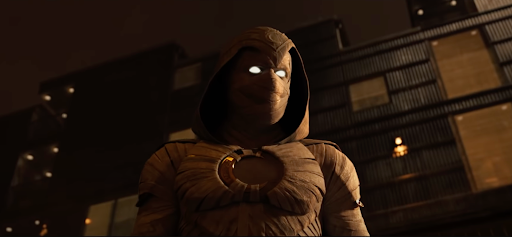
The Marvel Cinematic Universe is dominated by what seem like household names at this point, so it can be easy to forget that many characters were relatively unknown to the general public at one time. For example, heroes like Iron Man and Doctor Strange did not carry the same familiarity as Captain America or Spider-Man.
Kevin Feige and the rest of Marvel’s leadership team are hoping to replicate their previous successes in introducing Moon Knight through a six episode television series.
The latest series from Marvel Studios to hit Disney+, “Moon Knight” stars Oscar Isaac in the titular role. While most superheroes have a real name hidden behind their alias, Isaac’s character is unique in that he has two — a result of his dissociative identity disorder. While the American Marc Spector is a former secret agent turned mercenary, Steven Grant comes equipped with a British accent and a plethora of knowledge on ancient Egypt, stemming from his work in a museum gift shop.
Sharing the same body, there is a constant struggle between the two identities for control. This is only further complicated when serving the Egyptian god Khonshu, who grants them an ancient armor transforming them into Moon Knight. Much of the deity’s bidding includes violence, something that Grant is much less comfortable with than Spector. Meanwhile, when it has come to utilizing technical skills and expertise, Grant has been the better option.
Even as the rivaling personas do not get along, their tag team dynamic — mixed with the power of the Moon Knight mantle — proved to be a winning combination throughout the first half of this series.
Isaac has taken on this role and executed it to perfection thus far. He conveys a torment in each of the identities his character holds, stemming from not only the anguish of lacking full control, but the heavy burden of serving Khonshu as well. Spector also hopes to protect his wife Layla, something that has clearly taken a toll on him. Though Grant does not have that same weight of responsibility upon him, this is a high stress environment that he has been abruptly thrown into.
With all of this in mind, Isaac has done a masterful job portraying these struggles. His talents are best displayed at the end of the second episode, but his overall performance is something that I hope he receives critical acclaim for when the series is said and done.
Though Spector and Grant are typically at odds with one another, it is clear that they will need to work together if they want to defeat Ethan Hawke’s Arthur Harrow, the villain of the series. Hawke has played this role to perfection, as he is a manipulative, cultic zealot committed to unleashing the Egyptian goddess Ammit. One flaw I see in this role is its similarities to the villains in “Captain America: The Winter Soldier,” though this approach is mythical rather than technological. Even with feelings of déjà vu relating back to the 2014 masterpiece, I think the villain in “Moon Knight” is very well-developed.
Beyond the plot and writing so far, the technical aspects of the series have been sensational. The set designs have been aesthetically pleasing throughout, but most notably in the third episode. While the action scenes have left something to be desired, the storytelling and purpose behind them have made up for those issues. If this were a theatrical release, it would receive heavy criticism for that aspect; however, this is where Marvel’s expansion into producing limited series benefits them greatly.
On a separate note, there is a mysterious aspect to “Moon Knight” that sets it apart from other Marvel projects. Sure, there are twists and turns in any series, but lead writer, Jeremy Slater, does not spell out every detail for the viewer in this one. I enjoy that because many of the main characters are also unsure of what is going on. This facet has made me all the more engaged with the show on a week to week basis, which amplifies the “Marvel experience” so many can relate to when consuming all of the studio’s work.
While there are still three episodes to go, I’ve enjoyed much of what “Moon Knight” has had to offer so far. It is fantastic to see so much representation in a large-scale project, whether that be their inclusion of a character with dissociative identity disorder or the central role of Egypt and its rich culture. Expanding diversity within the Marvel Cinematic Universe, with the platform this franchise has, can do wonderful things for people with real-world connections to these aspects of the show.“Moon Knight” is now streaming on Disney+, with new episodes releasing every Wednesday until its May 4 finale. Disney+ is also home to most of the Marvel Studios catalog of films, though you do not need to be a comic book expert to enjoy this limited series.







